Saturday, December 30, 2006
As a personal note, my oldest daughter's wedding is today. So, I've been extra busy over the holidays with friends and family in town for the events and less engaged in political blogging. But you just can't get totally away from politics these days. The groom's family lives in Wisconsin. they like cheese and Democrats. A new brother-in-law regularly chats with Sen. Russ Feingold at a Madison camera store. The wedding party includes two active duty soldiers and two others who have served in Iraq and three retired from military service. We've had some interesting conversations this week!
Thursday, December 28, 2006

New Year's Eve
If you don't have plans for New Year's Eve yet, consider participating in Opening Night from
7 p.m.-midnight in Downtown Oklahoma City.
Opening Night 2007 invites everyone to Downtown Oklahoma City on New Year’s Eve to celebrate with music, dancing, theatre and fireworks! Since 1987, Opening Night has been the way to ring in the New Year. All performances take place in non-alcoholic venues.
Opening Night is Sunday, December 31st, 2006 from 7 p.m.-midnight in 13 venues around Downtown Oklahoma City and Bricktown. This year's entertainment features more than 40 performers on 18 stages.
An Opening Night admission button allows you access to all venues, all night long. Buttons are just $8 in advance, and $10 the day of the event, with children under five admitted free. Purchase buttons starting December 15 at MidFirst Bank locations, metro Homeland stores, Mathis Brothers Furniture, or at the event.
For more information on Opening Night call (405) 270-4848.
Make plans now to attend the inauguration ceremonies at the state capitol Monday, January 8, 2007. If you cannot attend plan to watch OETA-TV's live coverage of the event. The festivities begin at 11 a.m. on the south steps of the state capitol. For a full schedule of events read this.
My sincere congratulations go out to our winning statewide Democrats again and best wishes for a productive 2007. Congratulations to Gov. Brad Henry, Lt. Gov. Jari Askins, Atty. General Drew Edmondson, State Superintendent Sandy Garrett, Auditor Jeff McMahan, Insurance Commissioner Kim Holland, Labor Commissioner Lloyd Fields and State Treasurer Scott Meacham.
Tuesday, December 26, 2006
A couple of years ago a book "What's the Matter with Kansas?" made the reading list of a lot of Democrats I know. I read it. I got mad. So why Kansas and not Oklahoma?
This morning I was looking at a map hosted on the Grassroots Democrats website. It's one of those click on your state and get a profile of your state maps. I did that, then I clicked on the surrounding states. Here's what caught my eye under the Last Presidential Election Results category: In Oklahoma Bush got 65.6%; in Texas he got 61.1%; in Arkansas he got 54.4%; in Louisiana he got 56.7%; in Missouri he got 53.3%; in Kansas he got 62%; in Colorado he got 51%; and in New Mexico he got 49.8%. You would've thought that Bush was our hometown boy the way Oklahomans voted for him in 2004. Not anymore, his favorability is down to 43% in a Survey USA poll taken of Oklahomans just before Christmas; nationally he was at 36% in that same poll.
So my question is "What's the Matter with Oklahoma?" In 2004 we were an island of red in the heartland of America. Let's change that to what WAS the matter with Oklahoma and move on into 2007 and 2008 with conviction and clarity that support our state's Democratic heritage. We are a fiercely independent, populist people. We are patriotic and compassionate. We love football, pecan pie and black eyed peas with our fried okra. We do believe in investing in people and building community. We are the party of compassion, accountability, responsibility, and equality.
We do not have to be an embarrassing island of federal red again. Resolve to get involved in your local Democratic party organization in 2007. Get a head start on 2008 and turning our state Oklahoma Blue. Attend your local precinct meeting on March 8th. Volunteer for a local candidate or cause in the new year.
There's nothing the matter with Oklahoma that a group of committed Oklahoma Democrats can't fix. So get started!
Sunday, December 24, 2006

Governor Henry on Minimum Wage
Thanks to Arnold Hamilton at the Oklahoma Observer for posting his interview with Governor Henry on the Observer's new website. I'm looking forward to a lot of discussion and action in 2007 on the minimum wage issue. Democratic activists and some legislators laid a strong foundation for this in 2006 and I expect it will be a priority for many Democrats in the next session. I remember listening to Lt. Governor Elect Jari Askins at a RAISE Oklahoma rally on the capitol steps as she supported this initiative to raise the minimum wage in Oklahoma.)
Henry: Consensus Needed
On Minimum Wage Hike
By Arnold Hamilton
If the new Congress fails to act, Oklahoma should consider joining more than two-dozen states – including neighbors Arkansas, Missouri and Colorado – in increasing the minimum wage, Gov. Brad Henry says.
The Democratic governor didn’t suggest a specific amount, but thinks state leaders, working in concert with organized labor and business, could arrive at a figure that doesn’t put Oklahoma at a competitive disadvantage regionally.
“I certainly believe that working families in Oklahoma need to make more than the federal minimum wage,” Henry said in a wide-ranging, pre-Christmas interview with The Observer.
“It’s certainly an issue that’s worthy of discussion. I think we have to be careful. Obviously, if Oklahoma enacts a higher minimum wage in an island – with other states around us who have not acted – it could potentially cause some loss of business.
“We need to take all that into account before we just jump out and act.”
The federal minimum wage of $5.15 an hour hasn’t changed since 1997, but in recent years, 29 states and the District of Columbia have acted to help the working poor, immediately hiking the minimum to between $5.85 an hour in West Virginia and $7.63 in Washington.
Some states already have ordered future increases, as well. California, for example, is raising the minimum wage over three years – to $6.75 an hour in 2006, $7.50 in January 2007 and $8.00 in January 2008.
In Oklahoma, state Rep. Richard Morrissette, an Oklahoma City Democrat, has worked tirelessly, but unsuccessfully in recent years to win legislative approval of a minimum wage hike.
And an Oklahoma group seeking to raise the minimum wage $1 an hour failed in 2006 to secure enough signatures on an initiative petition to bring the proposal to a statewide vote.
“The best policy in my view is to have a national minimum wage, and one that keeps track with inflation, however you want to index that,” said Gov. Henry, who recently won landslide re-election to a second term.
“The problem again has been that Congress has not acted. So, like health care, like immigration, like so many other issues, they’ve devolved down to the states. I don’t know that the states can as effectively address these issues.”
Nationally, incoming House Speaker Nancy Pelosi, D-CA, says a minimum wage hike is one of several key proposals the new Democratic majority will attempt to pass in the first 100 hours of the 2007 Congress.
Another major stumbling block apparently has been removed: President Bush now says he supports a $2.10 per hour boost, phased-in over two years.
But he offers a caveat: “I believe we should do it in a way that does not punish the millions of small businesses that are creating most of the new jobs in our country. So I support pairing it with targeted tax and regulatory relief to help those small businesses stay competitive and to help keep our economy growing.”
Morrissette says he doubts the Congress and President can come to an agreement on the issue, citing three reasons:
First, the President likely will threaten to veto anything that doesn’t include significant business tax breaks, something Democrats may be unwilling to swallow.
Second, the Democratic majority in both houses may be too narrow to forge a consensus on the issue.
Third, House Republicans may not be in a mood – given their new minority status – to work with Democrats on much of anything.
“It’s not going to get done anytime soon in Washington,” Morrissette said. “Anybody who thinks so is kidding themselves.”
If he is correct, it will be up to the governor and state lawmakers to address – or ignore – the issue.
Morrissette says he plans to offer a 2007 version that would increase the minimum wage immediately to $6.50 an hour, with further hikes of up to $7.15 or $7.35 phased-in “during a reasonable period of time, whatever that is.”
His 2006 plan – a simple $1 per hour jump – died in committee on a 4-3 straight-party vote.
There are rumblings, however, that legislative Republicans – under pressure from churches and party moderates – may introduce their own, less aggressive version this year, perhaps tied to the Consumer Price Index or other economic indicators.
One reason elected officials in Washington and Oklahoma City cannot ignore the issue: Americans are adamant something must be done. A Pew Research Center poll last spring, for example, found 83 percent favor a $2 increase to $7.15 an hour.
Even more striking: support is almost universal. Seventy-two percent of Republicans, 91% of Democrats and 87% of independents endorse it. It’s also backed by 91% of those earning below $20,000 a year and 76% of those earning more than $75,000. And it’s strongly favored by all age groups, from 87% among 18-29 year olds to 78% among seniors [65-plus].
Gov. Henry, meanwhile, said he thinks most of Oklahoma’s working families already earn more than the federal minimum wage, but numerous studies underscore the state’s struggle to reduce poverty.
A 2005 U.S. Department of Agriculture report, for example, ranked Oklahoma’s hunger problem the nation’s worst.
Nationally, the Economic Policy Institute estimates 14.9 million workers would receive a salary increase if the minimum wage were raised to $7.25 an hour by 2008.
In Oklahoma, Morrissette says, between 16,000 and 32,000 Oklahomans earn minimum wage, depending on the survey. Most are adults – minority women, actually – not teen-agers, as some claim.
“This is a moral issue,” says Morrissette. “It’s immoral to pay people subservient wages.”
Three of Oklahoma’s neighbors didn’t wait for Congress to act on the minimum wage issue.
With the support of conservative Republican Gov. Mike Huckabee, Arkansas raised the minimum wage to $6.25 an hour. Missouri [$6.50 an hour] and Colorado [$6.85] also ordered increases – but took the additional step of linking future hikes to cost-of-living indexes.
Texas, Louisiana and New Mexico have taken no action on the issue, according to the National Conference of State Legislatures.
“I would certainly point to Arkansas, which just recently increased its minimum wage by working together with business and labor, coming up with a compromise that both business management and labor management signed off on,” Henry said.
“We could certainly pursue that type of course of action in Oklahoma. And if we’re going to seriously pursue a minimum wage increase, I think the best approach is to bring everybody to the table, both parties to the table, and try to build a consensus around an issue that everybody can live with.”

Lining Up Campaign Staff for 2008
I'm hearing that people with Oklahoma ties are signing on with presidential campaigns, and I don't mean Clinton or Obama. Today's story in the Washington Post would lead readers to believe that no one else will successfully enter the primary campaign. However, word is that John Edwards will announce next week from the 9th Ward in New Orleans. He has a very strong following in Oklahoma and some very talented operatives lining up for him. Governor Henry's fundraiser Michael Hayden signed on with Vilsack, the earliest official entry into the primary campaign and Tim Emrich has signed on with Biden. Emrich was a primary candidate for SD 16 in Norman this year and has worked for the Clintons and for Oklahoma's former Governor David Walters. General Wes Clark has a strong following here also and may pull talent from the state if he decides to run. To read today's "Clearing the Field" story on the WaPo website click here.
Thursday, December 21, 2006
Jason McCarty assembled a wonderful video of Oklahoma Democrats in 2006. Featuring the Vince Gill and Jimmy Webb song Oklahoma Rising.
See it for yourself: ODP year in review
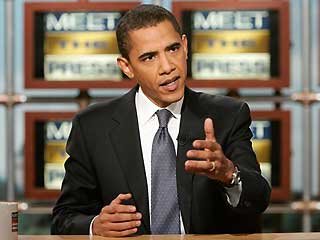
Presidential story with Andrew Rice connection
Barack Obama: Ready for Close-Up
Thursday , December 21, 2006
By Roger Friedman
Barack Obama is a senator, a bestselling author and a possible candidate for the presidency of the United States.
So it only makes sense that movie star is the next career he has to conquer.
Sources tell me that Obama has been filmed for months and will continue to be, all part of a project to make him the star of a documentary about himself.
The filmmaker, I’m told, is Amy Rice, a freelance cinematographer who’s been following Obama around for some time.
Rice, from Oklahoma City, lost her brother David, an investment banker, in the World Trade Center on Sept. 11. Her brother Andrew Rice worked for the BBC out of Canada at the time.
But after Sept. 11, according to published reports, Andrew Rice became politicized. This year he ran as a Democratic candidate for the Oklahoma State Senate District 46 seat vacated by Sen. Bernest Cain — and won. His campaign was helped because the Rices’ father, Hugh, is a prominent Oklahoma City attorney.
What kind of makes Amy Rice’s story even more interesting is that apparently the knockout blonde’s backer on the project is said to be actor Edward Norton, the Oscar nominee and current star of "The Painted Veil."
Norton isn’t her only actor friend. Last year, Rice was photographed at a red carpet premiere as the date of Ron Eldard, former boyfriend of Julianna Margulies.
Amy’s New York friends have also kicked in for her brother. Last March, Norton and a bunch of New York-based “next generation” actors including Paul Rudd, Janeane Garofalo and Fred Weller held a fundraiser for Andrew Rice at a Manhattan watering hole.
It’s good to have friends in the right places, since few would-be Oklahoma state senators get such treatment in either party. Or, make that none.
So stay tuned, because Barack Obama may yet get his own “Inconvenient Truth.” And thanks to his filmmaker, he may pick up a whole cadre of Hollywood types at the same time.
Oklahoma Democrats are invited to join a new Campaign that Calls for a Middle Class Agenda, including Raising the Minimum Wage, Making College Affordable, Repealing Big Oil Tax Breaks/Investing in Alternative Energy, and Allowing Medicare to Negotiate Lower Rx Drug Costs for Seniors
A coalition of organizations throughout Ohio including Ohio United, Progress Ohio, SEIU, AFSCME, Environment Ohio, and more will join together to launch a new campaign in Ohio called Change America Now (CAN) -- a national effort being mounted by nearly 40 groups in 31 states to pass the economic elements of the ‘100 Hour Agenda’ as outlined by incoming House Speaker Nancy Pelosi (D-CA). The following elements, which comprise the CAN 100 Hour Agenda, are to be voted on during the first 100 legislative hours of the 110th Congress in early January:
• Increasing the Minimum Wage
• Repealing Tax Breaks for Big Oil and Investing in Alternative Energy
• Eliminating the Prohibition on Medicare Negotiating with Drug Companies for Lower Prices
• Cutting the Interest Rates on Student Loans in Half
The Change America Now campaign is seeking to pass these priorities with large bipartisan majorities in the House of Representatives in effort to build momentum for them in a closely divided U.S. Senate and to apply sufficient pressure to have President Bush sign them into law. In addition, the Change America Now campaign is uniting progressive voices from across America to champion these issues and pass them into law as a down payment on advancing a broader agenda for American families in a number of areas including jobs and wages, healthcare, the environment and education. The CAN campaign will aggressively call on Members of Congress, especially Rep. Deborah Pryce, to give an early holiday present to the middle-class by supporting the CAN 100 Hour Agenda.
By: Gregory Kane, BlackAmericaWeb.com
Should Americans boycott products processed at the Smithfield Packing Co. plant in Tar Heel, N.C.? Leila McDowell thinks you should. Before you bite into that holiday ham, McDowell wants you to consider if was packed by what she calls “abused workers” at the Smithfield Tar Heel plant.
You’ve met McDowell before. I wrote about her in this column during the summer about the situation of Smithfield’s Tar Heel workers, the overwhelming majority of whom are black and Latino. Since April, McDowell has served as the communications coordinator of the Smithfield campaign for the United Food and Commercial Workers International Union.
McDowell could be the multi-tasking poster lady of 2006. In addition to her UFCW work, she’s a media consultant for the Washington, D.C.-based Milton S. Eisenhower Foundation, where she worked as the director of communications from 2000 to 2002. McDowell also works as a media consultant for the Venezuelan embassy.
“I work with (embassy personnel) on trying to get information out to the American people about what’s really going on in Venezuela, because there’s so many inaccuracies out there,” McDowell said (You may have correctly surmised that she supports the government of Venezuelan President Hugo Chavez.).

Minimum Wage Hike on First Order of Business
Even President Bush is jumping on the minimum wage hike wagon. And for good reasons, it's the right thing to do. Workers have waited ten years for a raise. Read today's story here. Last year a hardworking and committed group of mostly Democrats gathered signatures to put a minimum wage hike on the November 2006 ballot. The signature drive got a late start and was unable to raise the required number of signatures but the RAISE Oklahoma campaign gained strong support in the state legislature and from now Democratic Lt. Governor-elect Jari Askins. The Oklahoma Democratic Party's State Central Committee authored a resolution in support of the wage hike campaign in January. Expect to continue hearing from the RAISE Oklahoma organizers. They've formed a 527 organization - The Working Families Project - to carry on their mission here in Oklahoma. Learn more by visiting their website at http://www.workingfamiliesproject.com/.
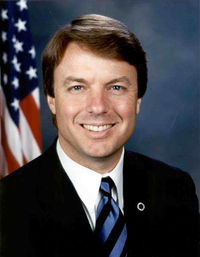
John Edwards - Labor's Man in '08
With his "sunny aura and commanding presence" John Edwards is aggressively seeking support from the nation's labor unions in his second quest for the Democratic Party's presidential nomination. A favorite in Oklahoma in 2004, Edwards has visited the state numerous times in the past two years and continues to be at the top of many Sooner lists. He's headlined fundraising events for House and Senate Democrats. Read about his ongoing quest in the Washington Post today. Click here for the full story. For more information on Edwards, visit his website at http://oneamericacommittee.com/.
Wednesday, December 20, 2006
Tuesday, December 19, 2006
Senate President Pro Tempore Mike Morgan Tuesday announced the members of his Democratic leadership team for the 51st Oklahoma Legislature. Morgan named Senator Charlie Laster, D-Shawnee, as Democratic co-floor leader.
“I have complete confidence in Senator Laster’s ability to work with his Republican counterpart in managing the daily floor activities in the Senate. As chairman of the Senate Judiciary Committee for the last two years, Senator Laster has deftly navigated difficult waters to emerge as a respected leader in the Senate.”
On Tuesday, Morgan also announced the selection of the following senators to leadership positions:
Jeff Rabon, D-Hugo, as Co-Assistant Floor Leader;
Jay Paul Gumm, D-Durant, as Co-Assistant Floor Leader;
Susan Paddack, D-Ada, as Democratic Whip;
Charles Wyrick, D-Fairland, as Democratic Whip;
Nancy Riley, D-Tulsa, as Democratic Whip;
And Kenneth Corn, D-Poteau, as Caucus Chairman.
“I am honored that these talented senators have agreed to serve on the Democratic leadership team. Each one of them is committed to doing their part to ensure that the Senate continues to serve the people of Oklahoma as this great institution has for the last 100 years,” Morgan said.
Morgan said he will jointly announce committee co-chairs and membership with Senate Republicans later this week. Following the Nov. 7 elections, the Senate will be evenly split with 24 Democrats and 24 Republicans for the 51st Oklahoma Legislature.
On
Join us in congratulating Ms. Pelosi on this historic achievement and celebrate our new Democratic majorities by sending the Speaker a message on her first day!
Congratulate the First Female Speaker - Sign the card today at www.womensvotecenter.org
Sign up to have your name counted and your community represented. Because of your hard work in every corner of our country, Democrats will return to congressional leadership, and will be led for the first time in our country's history by a woman. On January 4th, the DNC will collect messages sent from around the country to the new Speaker. The female staff at the DNC will be honored to carry your voices of congratulations to the Speaker's Chambers.
Oklahoma's primary date was changed in SB3 in 2003 by Sen. Keith Leftwich. The bill moved our date from the second Tuesday in March to the third Tuesday following the New Hampshire primary.
This site at politics1 is tracking presidential hopefuls on both sides.

Get On TV
Once upon a time GOTV meant Get Out The Vote. Now, it seems, it's more likely to mean Get On TV and it is the primary reason political campaigns are so expensive. Oklahomans viewed some great political ads and some really despicable ones this past cycle. Oklahoma Governor Brad Henry's tv commercials produced by D.C. firm Murphy Putnam were all-time favorites with many Democrats and Republicans I talked to. Everyone loved the Centenarians. Check out Henry's winning tv commercials here.
I was deeply troubled with one negative tv commerical, provided by an outside independent group, that boosted a GOP candidate's name identification and disgusted many voters resulting in a Democratic incumbent's defeat. In this case, negative did not work for our candidate, it worked against our candidate.
But Oklahoma wasn't the only place where tv commercials ruled the day. Check out this story about the top ten political commercials for 2006. You saw some of them, but it's worth taking a look at how both sides do tv. Check it out here.
For those interested in some background on political tv commercials read this 2004 story published in the Christian Science Monitor. For PBS fans check out the 30 second candidate site here.
Today's Washington Post carries a piece by Chris Cillizza outlining top campaign-in-waiting hires to the Clinton camp. I talked to a Democratic operative in Oklahoma yesterday who predicted a Gore-Obama ticket. Another state operative repeated the phrase I hear a lot, "I like Hillary, but.....". Come on Oklahoma, who will you be for in '08? Vote today in our blog poll. Then read about Hillary's hires here.
Monday, December 18, 2006
The theme on Wes Clark's Securing America site, in his speeches, and television appearances continues to be "It's Time to Lead." He's laid out a plan for a new direction. Oklahomans favored him in the 2004 presidential primary and I hear he's strongly considering a second run. While his strong suite is obviously national security and military affairs, he has developed well reasoned positions on the other issues that will be central to the 2008 campaign. While he make lack the star power of Clinton and Obama, well, maybe not, he IS a four star general, Clark takes a long view of leadership and history. Check out his blog at www.securingamerica.com. The General was the keynote speaker for a Democratic Party event in Stillwater in 2005.
Today's Washington Post has an interesting story on the impact of Sen. Evan Bayh's departure from the stage of hopeful Democratic presidential candidates. I know there were a number of Democrats and Republicans in Oklahoma who were already working behind the scenes for Bayh. I was approached early in the Fall by a Republican on behalf of Bayh. His obvious appeal to moderate, centrists was the pitch. The fact that his mother was an Enid native was also interesting. Read the story here. And if you haven't voted in our blog poll for your favorite candidate, at this time, do so today!
Friday, December 15, 2006
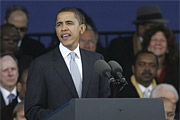
Obama, wife fears for his safety. Says he has a "pretty good chance of winning the nomination. Lynn Sweet
Sen. Barack Obama is concerned about his personal security —telling the Chicago Sun-Times editorial board Thursday that he and his wife fear there is a potential for violence — even if he does not run for president. “Being shot, obviously, that is the least-attractive option,’’ Obama said.
The Illinois Democrat told the Sun-Times he has concluded a 2008 White House bid “would be viable” and he would have “a pretty good chance of winning the nomination.’’
For the first time, Obama talked about the downside of his swelling popularity, before his expected presidential announcement in January, after a vacation in his native Hawaii.
Security, Obama said, referring to his wife, is “something that is on Michelle’s mind. And the minds of many of my friends. “I think it is something that will have to be addressed if I ran. You are not assigned Secret Service protection until you are effectively the nominee.” Obama said he “might have to build in” his own security provisions.
“Now I will tell you, this is something, this is one of the least-attractive — not the part about being shot, obviously, that is the least-attractive option. But even just having a security apparatus around you; one of the things that I have been very proud over the last several years, is, for all the hoopla, I am not an entourage guy. “. . . I have been accessible, and Michelle and I have gone out of our way not to change our habits. Even if I am not to run for president, the crush of attention has created a different set of problems.” Obama’s family has been nervous for some time for his safety.
On Sunday, Obama found himself surrounded by hundreds of people at two stops in New Hampshire. In Nairobi, Kenya, last August, Obama at a stop grabbed a bullhorn to talk to thousands of men stampeding in a street to see him. During that Kenyan visit, Obama’s half sister, Auma, gave an interview to Laurie Abraham of Elle magazine in which she worried about his safety. “Not to be offensive, there are crazy people in America as well, with crazy ideas. And at the end of the day, what matters is that he’s a black man. The history of America is quite violent,’’ Auma said in a story in the Elle December issue.
Thursday, December 14, 2006
Washington, DC - While President Bush continues to distance himself from the important recommendations of the Baker-Hamilton Commission, both the American people and our military commanders are supporting the work of the bipartisan group. A recent Newsweek poll found that Americans back the study group's "recommendations by a two-to-one margin," and that sixty-two percent of Americans "want the Bush administration to set a timetable for withdrawal." [Newsweek, 12/9/06]
At the same time, the Joint Chiefs of Staff "are recommending that the United States change its main military mission in Iraq from combating insurgents to supporting Iraqi troops and hunting terrorists," according to the Washington Post. Among the Joint Chiefs, there is also "growing concern about the erosion of the U.S. military's ability to deal with other crises around the world because of the heavy commitment in Iraq and the stress on troops and equipment." [Washington Post, 12/14/06] Democrats have argued for some time that the President's disastrous handling of the Iraq War has hurt our military readiness. Regardless of these facts, President Bush refuses to change course and has even delayed his announcement of a "new way forward."
Join the Capitol City Society at the Bricktown Brewery from 4:30 to 7:30 on Monday, December 18, for a few hours of fun and to enjoy each other's company. They will be upstairs, so look for the crowd when you get there or familiar faces.
In association with the season, please bring an unwrapped new toy for us to make a donation to one of the charitable groups that provide toys to those children who might not receive one this year.
If you are confused about what is the Capitol City Society, this is a group of younger politicos, legislators, lobbyists, business people, etc. We get together every few weeks to have a happy hour and network. These are the people that will be around and working in policy decision-making for the state for many years. This is a non-partisan group that encourages everyone to get to know each other outside the work environment so that will hopefully encourage better working relations in future endeavors.

Convention 2008
At our last DNC meeting in Chicago, members attended parties sponsored by the three cities vying for the 2008 DNC Convention: Minneapolis-St.Paul, Denver, and NYC. Since that meeting in Chicago the GOP selected Minneapolis-St. Paul for its '08 convention city so Democrats are now considering Denver and NYC. Personally, I would love to see us go to Denver. The American West is emerging for Democrats and I hope that we capitalize on that trend by selecting Denver. Read this story from yesterday's New York Times about the convention decision.
Democrats Still Weighing Where to Hold ‘08 Convention
By Rachel Kapochunas, New York Times
Democrats with 2008 on their minds will have to wait a bit longer to learn whether their party will hold its presidential nominating convention in Denver or in New York City. While a site selection announcement was widely expected to have been made by now, DNC spokesman Damien LaVera said Wednesday that “a final decision has not been made.”
But LaVera added that party officials likely are not going to put that decision off much longer, stating that the choice of which city will host the convention — to be held Aug. 25-28 in 2008 — is likely to come before Jan. 1.
The Republican National Convention got the jump in the convention sweepstakes in September by naming the Minneapolis-St. Paul metropolis as the location for its 2008 convention, to be held Sept. 1-4.
The Twin Cities also had competed for the Democratic convention, but the GOP’s preemptive move forced the Democrats to drop Minneapolis-St. Paul from its short list of finalists.
That left just New York City — a 2008 also-ran to again host the GOP convention, as it did in 2004 — and Denver in the running for the Democratic convention. A fourth finalist city, New Orleans, dropped its bid in July, citing financial and logistical difficulties.
The Democratic faceoff pits Denver — a relative novice at hosting conventions, but a key city in a fast-growing Mountain West region that increasingly is a partisan battleground — against New York City, one of the most seasoned convention hosts and a Democratic Party stronghold of long standing.
Denver has hosted one convention, exactly 100 years earlier: The Democrats picked William Jennings Bryan of neighboring Nebraska, whose third and final bid as the party’s presidential nominee ended in his defeat by Republican William Howard Taft.
By contrast, New York City has a long hosting history, having been home to five Democratic and the 2004 Republican conventions.
Most of those occurred over the past three decades: The nation’s most populous city hosted the 1976 and 1980 Democratic conventions that nominated Jimmy Carter, the 1992 convention that sent Democrat Bill Clinton to his first White House term, and the 2004 Republican convention at which President Bush was renominated.
Denver officials contend their city is the right choice not only because of its own assets, but because of the potential of a convention in the Mountain West to energize the party in what strategists say will be a crucial area for Democratic growth in future elections.
“It’s a stage that will launch our nominee in a way that sends a message that the Democratic Party is broadening its scope and going to compete very, very strongly in the West,” Debbie Willhite, executive director of the Denver 2008 Convention Host Committee, told CQPolitics.com.
Democrats, whose presidential candidates have for years had to rely mostly on the states of the Northeast, upper Midwest and Pacific Coast for their base of electoral support, are hailing recent gains they say are eroding the Republicans’ longterm and strong grip on the Interior West.
In Colorado alone, Democrat Bill Ritter this year captured the governor’s seat left open by retiring Republican Bill Owens; Democrat Ed Perlmutter won the 7th Congressional District seat that Republican Rep. Bob Beauprez left open to run for governor, a win that gave the Democrats a 4-3 edge in the state’s House delegation; and the party maintained the holds on both chambers of the state legislature that it had won in 2004.
New York hardly has to build up its reputation as a Democratic powerhouse. Although the Republican Party chose to hold its 2004 convention there — a decision made in the aftermath of the Sept. 11, 2001 terrorist attacks on the World Trade Center — the city gave 75 percent of its presidential vote that year to Democratic nominee John Kerry.
New York Sen. Hillary Rodham Clinton and gubernatorial nominee Eliot Spitzer won landslide victories for the Democrats this November, and party pickups of three formerly Republican House seats boosted the Democrats to a 23-6 advantage in the state’s House delegation.
But Willhite, while conceding that New York would probably produce a “great convention,” said “there’s no news” surrounding that selection. Instead, the reaction might be, “Democratic Party goes to New York ... again,” said Willhite.
Many observers expected DNC Chairman Howard Dean, the former governor of Vermont and a contender for the 2004 Democratic presidential nomination, to make a final decision earlier this month. But Willhite said officials in both contending cities are still in the process of finalizing the draft contracts sent to them by the DNC, according to Willhite.
Contracts are likely to include agreements regarding hotel room reservations, transportation, and main convention locations, which would be the Pepsi Center in downtown Denver and Madison Square Garden in the central New York City borough of Manhattan.
One of the biggest questions raised about Denver — especially by those favoring a pick of New York City — is whether the Western city really has the accomodations needed to host the convention. New York City, population 8 million, is a tourist magnet. Denver, population 555,000, is much less so.
But Denver’s host committee, which estimates that the convention will draw 35,000 visitors, states that they are currently holding nearly 19,000 hotel rooms for participants. The committee’s Web site boasts an expected $150 to $200 million in “economic benefits” gained from hosting the convention.
Meanwhile, the Republican National Committee is expected to ratify its site selection committee’s choice of Minneapolis-St. Paul at its winter meeting in Washington next month.
© 2006 Congressional Quarterl

New York New York
The latest Washington Post-ABC News poll shows NY Senator Hillary Clinton and former NYC Mayor Rudy Giuliani are the probable favorites and the front runners for the Democratic and Republican nominations for President in 2008. Clinton's favorables are at 56% and Giuliani's are at 67%. Former VP nominee John Edwards is at 49% and Illinois Senator phenom Barak Obama is at 44%. Read today's story here.
In the "if the Democratic primary were held today in your state" question the results show Clinton with 39%, Obama at 17%, Edwards 12%, Gore 10%, Kerry 7%, Biden and Richardson each at 2%, and Bayh, Clark and Vilsack with 1% each.
The same poll shows Bush's approval at 36% with only 18% strong approval.
70% of the respondents disapprove of the way things are going in Iraq.
70% of the respondents all believe that troops in Iraq should be decreased but not withdrawn immediately.
Read the poll here.
Wednesday, December 13, 2006

Stocking Stuffer Idea
Pick up your loved ones a great stocking stuffer -- The Oklahoma Centennial Commission's “Oklahoma Rising,” a limited edition two-disc set celebrating the state’s rich musical heritage.
“Oklahoma Rising” features a blend of classic and contemporary Oklahoma artists from all genres. The once-in-a-lifetime CD collection includes 46 songs by 43 Oklahoma recording artists and groups, including Vince Gill, Reba McEntire, Garth Brooks, Carrie Underwood, Toby Keith and Jimmy Webb. The first disc, called “A Unique History,” highlights celebrated musicians from the state’s earlier days including Gene Autry, Chet Baker, Patti Page, Charlie Christian, BJ Thomas, Leon Russell and Leona Mitchell. The second disc, aptly named “An Extraordinary Future,” celebrates many of Oklahoma’s current stars and up-and-comers, including The All American Rejects, Brooks and Dunn, Katrina Elam, The Tractors, Sandi Patty and The Flaming Lips. The “Oklahoma Rising” double CD set is available at 106 Oklahoma City metro area 7-Eleven stores. Net proceeds from the $19.99 CD will benefit Habitat for Humanity in Oklahoma.
Oklahoma singer-songwriters Jimmy Webb and Vince Gill have collaborated to create an anthem for Oklahoma’s Centennial Celebration titled Oklahoma Rising. Click Here to listen.
Monday, December 11, 2006
Washington, DC - Today, President Bush is meeting with State Department officials and historians on Iraq in what has been described as a “listening tour.” [New York Sun, 12/11/06] At the same time, the American people are growing frustrated with the Bush Administration’s failed Iraq policies and are desperate for a change and a new direction. According to the latest Newsweek poll, sixty-eight percent of Americans believe that the United States is losing ground in Iraq, the highest rating ever in the poll. [Newsweek, 12/9/06]
“It's a good first step for President Bush to finally begin listening to outside opinions on Iraq, but it is ultimately more important that he offer the American people a new direction,” said Democratic National Committee Press Secretary Stacie Paxton. “As the bipartisan Iraqi Study Group’s report determined, the situation in Iraq is ‘grave and deteriorating.’ The President needs to offer a real strategy for victory that acknowledges the facts on the ground in Iraq before it is too late. Democrats remain committed to a new direction.”
Sunday, December 10, 2006

CD5 Democrats Holiday Celebration
Last night the CD5 Democrats honored Rep. Al Lindley with the annual Keith Leftwich Memorial Award. State Senator Debbe Leftwich praised Lindley for his activism and service to his constituents in south Oklahoma City's House District 93. Leftwich said Lindley best represents the courage and lead
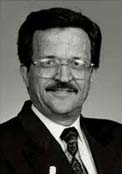 ership that so many remember her late husband for.
ership that so many remember her late husband for.State Rep. Richard Morrissette (HD92) added his praise for his colleague and admonished all present to conduct their business and personal lives like "real Democrats" so as to continue the legacy of Senator Keith Leftwich. (Keith Leftwich was Senator in District 44 when he died in September 2003. Debbe Leftwich was elected in December 2003 to complete his term and then she ran unopposed in 2006 for her first full term in the State Senate.)
Former ODP Chair Jay Parmley emceed the evening and introduced Senator Andrew Rice to give the first Keith Smith award. The award was given to Smith, posthumously, for his service and activism on behalf of women, children, the environment, and Democrats. Linda Gray Murphy accepted the award on his behalf.
I was pleased to bring a short thank you message from the Oklahoma Democratic Party to the group before dinner. Thanks to Bob Lemon for his gracious support of the event. It was great to see party officials from other districts at the event also; Judy Calhoun from CD4 and Anita Norman from CD3 were there. I'm always happy to see Gordon and Judy Melson and Liz Estes from Seminole. (They are also very generous supporters of the Democratic Party.)
Congratulations to CD5 officers for a nice event: Jeremy Hendricks, Lillie Buckner, and Debbie Hogue-Downing.
I enjoyed dinner conversation with Oklahoma County Democratic Party Chair Kitti Asberry, ODP/DNC organizer Teresa Hill, Calvin Rees and Ellen Stevens. And I can't forget one of my very favorite Democrats Marjean Mitchell who has been one of the ODP's best volunteers for years. Some of the others attending were Rep. Ryan McMullen and Jenna Kennedy, Rep. Mike Shelton, Cassie McCoy, Ward Curtin, Ron Davis, Russell Griffin, Glenn and Jane Hightower, Dana Orwig, and at least a hundred others.
The event was held at the Teamsters Local Union 866 Hall.
Friday, December 08, 2006
When The Voters Take Charge of the Political Environment
(This editorial by Lee Hamilton applies to Washington but is equally important as Oklahoma begins our 2nd century as a state with a 24-24 tie in the State Senate. I particularly like his idea that it's how you use your power as much as what you do with it. Hamilton served in the U.S. House of Representatives and recently cochaired the Iraq Study Group. He's involved with civic education and civic engagement initiatives that I have the privilege of being involved with also. Please read his most recent thoughts about civility and the political climate we now have.)
One of the oldest tricks in the political playbook is to cite the results of congressional elections as proof that the American people want X or reject Y, in accordance with the speaker’s own view of the world.
So it has been — at least, in Washington — with this year’s voting. Americans want out of Iraq, say various commentators, or have grown tired of President Bush and of the last few years’ congressional shenanigans. No, say others, they are angry at Republicans for violating conservative fiscal principles, or simply fell for a few middle-of-the-road Democrats in traditionally “red” states.
The truth is, election results are built on the individual decisions of millions of people voting for or against hundreds of different candidates, and sweeping generalizations are always risky. In every election there are two elections: the actual voting, and what the politicians say the voters meant. But as January approaches, and with it the transition from Republican to Democratic rule on Capitol Hill, both parties might at least want to remember that voters had something more than policy issues on their minds: They wanted change in the political environment on Capitol Hill.
Congressional majorities get overly cocky and sometimes forget that Congress is, after all, the people’s legislature. The Democrats did this during the 1980s and 1990s, and were chided for it by the voters in 1994, when they lost their majority. The Republicans did it over the last decade, and paid the price in November. If there was a clear message from the voters, I believe it had less to do with policy than an overall perception that they didn’t like the way Congress was performing. It’s a reminder for both parties that how you use power can be just as important to the American people as what you accomplish with it.
This is a bracing facet of our democracy. There were plenty of people within the halls of Congress who were discomfited in recent years by how it operated, but, because they were in the minority or were not part of the leadership, they were powerless to do much about it. Instead, it fell to the voters to force change in Congress.
In doing so, they have created a new dynamic on Capitol Hill, a sense of optimism and a belief that old foes can start anew. So there is a tremendous opportunity at the moment to heal some of the breaches that developed in recent years — to construct a Congress that is genuinely bipartisan, that upholds time-tested legislative processes designed to give a voice to the manifold interests in this diverse nation, and that behaves like an institution proud of its independent constitutional role.
The voters have handed political leaders — not just in Congress, but in the White House as well — an opportunity to make progress on issues critical to the nation by serving as uniters, not dividers; by taking the path of cooperation, not confrontation; and by understanding that if anything over the next two years is to get done by a Republican president and a narrowly Democratic Congress, it will have to be by appealing to the middle ground.
If they do, then I believe any number of issues that in recent years have seemed intractable will turn out to be resolvable — if not in one fell swoop, then at least in increments.
So, for instance, we may be unable to balance our budget at once, but we can certainly put national finances on a more sustainable path. There is clearly central ground on immigration questions that can be enlarged and turned into successful legislation. Health care, energy conservation, the environment — all of these are issues upon which legislators of good will with a willingness to compromise can make progress. Even in a controversial arena like tax reform, a Congress and a president determined to work together can at least clean up the tax code, strengthen tax collection, and remove inequities and loopholes that all agree have long needed addressing.
I don’t believe for a moment that cooperation is the only path open to our leaders. They could just as easily fall back on the tired habit of confrontation. If this happens, with a slender majority of one party in Congress and a president of the other in the White House, then we face two years of stalemate.
I prefer to hope that the recent election will instead work to cleanse Washington of the bad blood and politics of accusation and resentment that have characterized it in recent years, and encourage our leaders to resolve to turn over a new leaf.
Certainly that is the tone that both the President and congressional leaders have been adopting since the election. If they live up to their rhetoric, then the new sense of energy and purpose that American voters gave to Capitol Hill on Election Day should yield benefits we all can enjoy.
Lee Hamilton is Director of the Center on Congress at Indiana University. He was a member of the U.S. House of Representatives for 34 years.
Thursday, December 07, 2006

Many Merry Democrats
What a great evening at the ODP HQ with so many volunteers talking about their accomplishments this cycle and enjoying the wonderful refreshments provided by the Oklahoma County Democratic Party officers Kitti Asberry, Ron Wasson, and Lynn Greene. We are always glad to have fellow Democrats at the Krumme Center and tonight was no exception. If I start listing everyone I talked to tonight I might miss someone, so I'll apologize in advance and try to list all from memory: Besides Kitti, Ron, and Lynn and our ODP staff Jason, Lindsey, Courtney and Teresa those attending included elected officials Rep. Scott Inman, Rep. Al Lindley, Rep. Anastasia Pittman and Sen. Debbe Leftwich. Also Louise S., Louise D., Pat Potts, Linda, Patty Presley, Debbie Hogue-Downing and Carl Downing, Dana Orwig, Emily Allen, Carolyn and Norman Taylor, Forrest Rush, Steve VanHook, Victor Gorin, Bill Clifford, Jeremy Hendricks, Russell Griffin, Ward Curtin, Cerita Morley, Jamelle Hollieway, Vicki and Will Langford, Christine Byrd, Harley Venters and at least 40 others.
Thanks again to all of the volunteers and party officials for a great year! (I promise pictures tomorrow.)
Americans want this Congress to finish its job, not pass the buck. From Veterans health care to Social Security, the Republicans' decision to walk away from its job has very real consequences for our country. The business of the 109th Congress should not be the business of the 110th. But when Republicans leave town with their work unfinished, Democrats are ready to work next year to clean up their mess, clean up Congress and deliver results to the American people.
The Iraq Study Group says Iraq is "grave and deteriorating." The President's new Defense Secretary says "we're not winning." The time has come for change in Iraq. The President has the ball in his court. The Iraq Study Group did a great service to our troops and to our country. Their report is an authoritative look at the deteriorating conditions in Iraq that put our troops at risk and a strong case for the President to change his policy.
The Study Group's findings mirror what the American people said last month: there must be immediate change in Iraq, and we should begin the phased redeployment of our combat troops.
The ball is in the President's court. He must bring the country together and change course in Iraq. He will find Congress ready and willing to work with him if he does. The troops have given so much. The time has come for President Bush to bring the country together behind a new course in Iraq.
I do not know about everyone else, but I am a huge fan of The Daily Show on Comedy Central. We just received a phone call letting us know the crew from the show is in Downtown Oklahoma City at the Sheraton interviewing Bill Crozier. For those of you who are not exactly sure who he is...Bill Crozier is the Republican who ran against Sandy Garrett for Superintendent of Public Instruction. Just so you know Garrett won by 67% of the vote. I do not know when the show will air, but when I find out I will publish it here so we can all watch!
Over on Daily Kos a straw poll started yesterday shows Barak Obama and John Edwards tied at 28% each followed by Wes Clark with 27%. Bill Richardson and Hillary Clinton each get 5% with John Kerry and Evan Bayh at 2%. Tom Vilsack and Joe Biden get 1%. If you care about such things, go vote on the poll and watch the results come in.
So basically, it's Senator, Senator, General, Governor, Senator, Senator, Senator, Governor, Senator. Is there a pattern here?
Remember, JFK was the last Senator to win the White House. And don't forget that Bush, Clinton, and Carter were all Governors. The last General was Eisenhower.
 Senate Review by Senator Randy Bass
Senate Review by Senator Randy BassEven though the 2007 Legislative session will not formally begin for several more weeks, preparation is well underway and in fact has been going on for the past several months.
Once the regular session ends at the end of May, many lawmakers turn their attention to issues that are on the horizon for the next year's session. Many of these issues can be complicated and require in-depth studies. For that reason, members may request interim studies on a particular topic. Generally, meetings examining these issues begin anywhere from the summer to the early fall and generally conclude before the end of the year. Often, the interim study committee will prepare a final report summarizing what has been learned in those meetings and what recommendations they may have for changes to existing law or for a new law to address the problems they've identified.
The first hard deadline Senators must meet in the legislative process is December 8, 2006. When members want to write a bill proposing a new law or a change one already on the books, they work with staff members to put that proposal into bill form and determine which part of state statutes that measure would deal with. December 8 is our deadline for making such requests.
Our next important date will be January 2,2007. In sessions that follow an election cycle, the State Constitution gives us one organizational day in January to elect the President Pro Tempore of the Senate and to adopt the rules by which we will operate for the rest of the session. That will occur on January 2.
The next import date is January 18, 2007. That is the deadline for filing all the bills a member has previously requested. Any bills that are not filed by that deadline will not be heard during the upcoming session.
Finally, the actual 2007 Legislative session will formally begin on February 5, 2007. For the next several weeks, we will then meet a series of deadlines for moving bills through the committee* process, onto the floor for full consideration by our chamber, and then face additional deadlines to move those same measures through an identical process in the House of Representatives. By law, we must conclude the 2007 session by no later than 5 p.m. on Friday, May 25th.
If you would like to learn more about our legislative calendar, or read bills that will be filed in the coming weeks, go to www.oksenate.gov and follow the links for schedules, legislation, or any other area that may interest you.
As always if you have a question about a legislative matter, please do not hesitate to contact my office at (405) 521-5567 or by email at bass@oksenate.gov.
Wednesday, December 06, 2006
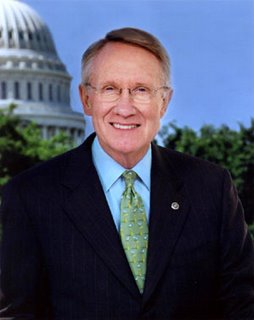
Harry Reid: Here’s How Democrats Plan to Say Thank You to Blacks Who Elected Them
Date: Wednesday, December 06, 2006
By: Sen. Harry Reid, Special to BlackAmericaWeb.com
During his commentary on the "Tom Joyner Morning Show" after last month's mid-term elections, Tavis Smiley noted that the Democratic Party enjoyed overwhelming support from African-Americans and that it was important for the Democratic leadership to say thank you.
Today, on behalf of my party, I offer that thanks. For the first time in 12 years, Democrats enjoy a majority in both houses of Congress. This would not have been possible without the tremendous support from the African-American community.
As Senate Democratic leader, I’m often asked the question, “Does the Democratic Party take African-American support for granted?” Absolutely not. We’re not above criticism, but we don’t take anyone for granted, as our record of the last two years shows.
When President Bush attempted to privatize Social Security, a program that provides the only source of income for one in three African-Americans 65 and older, as well as disability and survivor benefits, Democrats fought and defeated his proposal.
When President Bush attempted to pack the courts with conservative right-wing judges, seeking to roll back the civil rights that countless Americans sacrificed so much to gain, Democrats fought to keep the worst nominees from being seated.
When forces were conspiring to delay passage of the Voting Rights Act, Democrats worked with their colleagues on both sides of the aisle to secure the future of voting rights for all Americans.
When the administration provided slow relief for victims of Hurricane Katrina, again, it was Democrats who fought -- and continue the fight -- to provide additional relief.
After all, this election was bigger than Democrats and our supporters. This election was about a new direction at home and abroad. The best way for Democrats, to repay Americans -- including African-Americans -- for supporting us is to deliver the new direction they demanded at the ballot box.
I’m committed to doing my part, and in the Senate, I’ve presented three principles to guide the way: bipartisanship, open and honest government and results. In the weeks and months ahead, I intend to do everything in my power to ensure that our government delivers resources to those in need, instead of wasting them.
Democrats are committed to working in a bipartisan fashion with President Bush, as well as our Republican colleagues in the House and Senate. However, you can rest assured that Democrats take Congress’ role of oversight of the administration seriously. For the first time in more than six years, this administration will be held accountable for its actions, and our system of checks and balances will be restored.
For years, Congress has sat on the sidelines, doing nothing, while challenges in health care, energy, the economy and Iraq have grown worse. I believe it’s time for Democrats and Republicans to work together to achieve results. By results, I mean an increase in the minimum wage and improving access to affordable health care. I mean increased funding for college education, reduced tuition costs so that all deserving students achieve their dreams, and the creation of new jobs that don’t just help families keep their heads above water, but that help them get ahead.
These are the issues Democrats campaigned on, and they are the issues Americans, including African-Americans, came out to support. Democrats are ready to move this agenda forward and move America forward with it. Delivering a new direction for America is how we’ll really say thank you to African-Americans, and we'll keep earning your support.
 Legislators: State Needs to Step Forward in the Absence of Federal Agriculture Disaster Aid
Legislators: State Needs to Step Forward in the Absence of Federal Agriculture Disaster AidIn response to Congress’ failure to pass a nearly $4.5 billion agriculture disaster relief package on Tuesday, state Sen. Jeff Rabon on Wednesday said the state must step forward with a comprehensive assistance package for Oklahoma farmers and ranchers.
“Oklahoma livestock producers and farmers are currently facing dire conditions brought on by one of the worst drought periods in state history,” said Rabon, D-Hugo. “This two-year drought cycle has resulted in the poorest wheat crop in decades.”
In September, it was announced the state would receive just $6.5 million from the USDA to be distributed to livestock producers. Oklahoma farmers, however, could be left with nothing following the failure of the federal emergency aid effort, Rabon said. With Oklahoma farmers in the second year of a devastating drought cycle, Rabon added, quick action is necessary.
“I’m disappointed that there wasn’t adequate support for an aid package that would help offset major losses suffered by one of the state’s biggest industries,” Rabon said. “This should be an issue that transcends party lines, and there must be a sense of urgency to get this done at the state level.”
The $4.5 billion disaster relief package, sponsored by U.S. Senator Kent Conrad of South Dakota, was removed from the agenda after failing to pass a point of order. Oklahoma Senators Jim Inhofe and Tom Coburn both voted against Conrad’s motion. Rabon said the state should act quickly to assist farmers and ranchers with funding from the state’s current budget surplus of nearly $100 million and with money from the Rainy Day Fund.
Rabon noted that in August, Gov. Brad Henry made appeals to both President Bush and Congress regarding the need for agricultural disaster relief, and Congress’ failure to approve the relief package will delay any action on the issue until Congress reconvenes next year.
Rabon was joined by state Sen. Earl Garrison and state Rep. Terry Hyman in his request for state officials to begin preparing a comprehensive relief package for farmers and ranchers.
“As a rancher myself, I understand the severity of this drought and the effect it’s had,” said Garrison, D-Muskogee. “Farmers and ranchers throughout the state are really suffering – the wheat crop in western Oklahoma was very poor and ranchers who rely on stocker cattle for income are paying exorbitant prices for hay and water lines are continuing to recede. This is one of the state’s biggest industries and I fully support any effort to put together a relief package.”
Hyman noted that even if a relief package is eventually approved, it could take more than a year before Oklahoma farmers receive any funds, making prompt action even more critical.
“The agricultural industry accounts for a great percentage of Oklahoma’s overall economy, and protecting this industry should be a principal concern for any state leader, whether in Oklahoma City or Washington,” said Hyman, D-Leon. “Now that efforts to block federal action on this issue have succeeded, it’s imperative that we put together a funding package to deal with this situation.”
Enjoyed the ribbon cutting ceremony last night for OKC's newest urban living environment project at what used to be called Founders Tower, now called 360. Lt. Governor Elect Jari Askins cut the ribbon for the $50 million project that is the creation of OKC businessman and entrepeneur Jim Meyer. The event held in Nikz at the top of the tower was a ground breaking/ribbon cutting to launch the remodel project.
Yesterday Governor Brad Henry appointed Meyer to the EDGE Fund Policy Board.
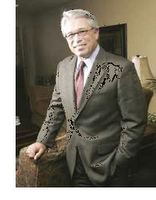
I was pleased to share a dinner table there with Rep. Al McAffrey, Linda Murphy, and Ben Odom. Former Democratic legislator Laura Boyd and Rep. Mike Shelton were there also. Jim Meyer and I are both in Leadership Oklahoma Class XX.
More than one person questioned me about Meyer's possible political future. Meyer had early considered running for the 5th District Congressional seat but obviously did not, although, if he ran, he would run as a business savvy forward thinking Democrat. We need that. Oklahoma needs that.
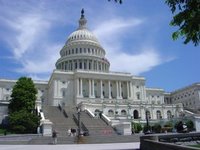
103 Days
One hundred three days, that's how many days Congress was in session this year; seven days short of the infamous 1948 Do Nothing Congress. But that's fixin' to change according to recently elected Democratic Majority Leader Steny Hoyer who released the House schedule to begin January 4th. Read about it here.
The Republicans are saying the extended work schedule is proof that Democrats don't care about families! The Republicans are whining about, well about everything. And they are looking at the silver lining thinking that less time for freshmen representatives in their districts means vulnerability in the '08 elections. Hmmmmm. Oklahoma Democrats could take advantage of this opportunity and start now working on CD1, 3, 4 and 5 as possible pick ups in '08.
BTW, the current salary for rank and file members of the U.S. House and Senate is $165,200 per year.

Letters to the Editor
If you've ever wanted to write a letter to the editor (LTE) but weren't sure what to say or how to say it? Fret not, the DNC has a great tool on its website that can assist you in writing your letter to the editor. Check it out here.
If you write a LTE let us know at the ODP; send us a copy for our pressbook. If the online tool isn't what you need contact our communications director at the ODP. Call or email Jason McCarty at 405.427.3366 or jasonmccarty@okdemocrats.org.
Tuesday, December 05, 2006
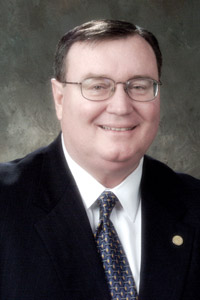
Congratulations to Oklahoma's New Chancellor
Congratulations to former Speaker of the House, now President of Southeastern Oklahoma State University, Glen D. Johnson on selection as Oklahoma's Chancellor of the State Regents for Higher Education. Johnson is a long time champion of public education and is expected to lead the state's higher education system with great expertise and passion.
While the students and faculty at SEOSU will miss him, students and faculty from across the state will benefit from his informed and reasonable leadership.
(I recently had the privilege of being a guest lecturer for a class he teaches at SEOSU. From our short visit then I could tell he is bound to make Oklahoma's second century a great success for higher education.)
McCain Hopes for Short Memories in Iowa
Washington, DC- Today Senator John McCain will open his campaign office in Iowa signaling the start of his bid for the GOP Presidential nomination. But the Arizona Senator is relying on Iowans having a short memory, hoping that they will forget his unwillingness to compete in the state in 2000. Perhaps McCain believes he can remake his record on ethanol, country of origin labeling, the packer ban and other agricultural issues that have put him at odds with Iowa Republicans in the past.
"If Senator McCain thinks Iowans will forget that he refused to campaign in the state because of his position on ethanol, then the 'Doubletalk Express' is already running on fumes," said Democratic National Committee Press Secretary Stacie Paxton. "Recently McCain has undergone an extreme make-over on tax cuts, campaign finance reform and now he's changed his position on ethanol. One thing is clear, John McCain's willingness to say or do anything just to win shows just how out of touch he is with Iowa's values."
See below for a DNC Research document on McCain's record:
McCain Didn't Compete In Iowa In 2000 Because Of His Opposition To Ethanol, But Committed To Play In The State In 2008. McCain "'knew that being against ethanol subsidies and with his support of campaign finance reform, he was not going to do well in Iowa [in 2000],' said Michael Dennehy, McCain's friend and his former New Hampshire campaign director." By skipping the caucuses in 2000, McCain "effectively ceding the state to George W. Bush," but in early 2006, Iowa RNC member Steve Roberts was chatted up by McCain aides, after which Roberts confirmed McCain's commitment to Iowa, saying, "I know they're going to play in Iowa. They said they were." [Union Leader, 10/23/03; National Journal, 2/4/06]
McCain Opposed Ethanol Subsidies, Called It "Corporate Welfare," "Highway Robbery," A "Hidden Gas Tax," And "Not Worth It." In 1999, John McCain said, "Well, on ethanol subsidies, obviously, I oppose that, have always opposed it, as I have most other subsidies." During his 2000 campaign, McCain called for eliminating the "corporate welfare doled out to" ethanol grants, and stated "ethanol is not right, the subsidies should be phased out." McCain, in 2003, "blasted the ethanol mandate as 'highway robbery perpetrated on the American public.'" McCain added that ethanol offered no benefits, saying, "Ethanol does nothing to reduce fuel consumption, nothing to increase our energy independence, nothing to improve air quality." In 2003, McCain labeled the ethanol provision in a pending Senate bill "a hidden gas tax." During a 1999 Presidential debate in Iowa John McCain said, "Ethanol is not worth it. It does not help the consumer. Those ethanol subsidies should be phased out." [Fox News, 6/15/99; Houston Chronicle, 2/11/00; Associated Press, 1/3/00; Congressional Quarterly, 5/9/03; The Oregonian, 11/22/03; Fortune, 11/13/06; Des Moines GOP Primary Debate, 12/13/99; Des Moines Register, 12/19/99]
McCain Voted Against Ethanol in 2005, 2004, and 2003. In 2005, John McCain "voted with ethanol's critics" against Senate legislation which "would require 8 billion gallons of ethanol to be blended with U.S. gasoline by 2012." In 2004, John McCain voted against an amendment to Senate Bill S 150 to promote ethanol, declaring that ethanol was "a product that we have created a market for which has absolutely, under no circumstances, any value whatsoever except to corn producers and Archer Daniels Midland and other large agribusinesses." In 2003, John McCain voted to block a final vote to an "energy bill coveted by Iowa farm interests" that "would double use of corn-based ethanol." Also in 2003, McCain [AP, 6/18/05; USA Today, 6/20/05; H.R. 6, 6/14/05, Roll Call #137, 6/15/05, Roll Call #138, 139; Aberdeen American News, 5/2/04, S.Res. 150, 4/29/04, Roll Call #74; Des Moines Register, 11/22/03; H.R. 6, 11/21/03, Roll Call #456]
FLIP FLOP: McCain Softened Stance On Ethanol, Called For Increased Study And Investment. With his eye on 2008, McCain changed his tone on ethanol. Tim Russert called McCain's new stance of "embracing ethanol" as a "profound change," and pointed out that even when oil was $60 a barrel, he denounced it in a press release. McCain indicated while in Iowa "that he thinks ethanol can be competitive in an increasingly costly oil market." The Des Moines Register called McCain's adjusted position "a slight softening of his earlier opposition" to ethanol. In Iowa, McCain said, "At $10 a barrel [for oil], I don't think ethanol was a very viable option. At $60 or $70 a barrel, I think it needs to be examined." McCain added that "There's also national security implications but I was and remain opposed to subsidies . if ethanol is a viable option, it can compete, as it certainly can with $70-a-barrel oil. I think it ought to be something that ought to be carefully examined." Speaking at the Clean Cities Conference in Phoenix in May 2006, McCain called for "increased investment in the use of ethanol," to reduce the impact of climate change. [NBC News, 11/12/06; Des Moines Register, 4/13/06; Arizona Republic, 5/9/06]
McCain Voted Against The Packer Ban In 2002. John McCain voted against the Farm Bill in 2002, which contained a packer ban. McCain voted against Iowa's two Senators, Harkin and Grassley, on both the Senate bill and the conference report with the house of the Agriculture, Conservation, and Rural Enhancement Act of 2002, also known as the Farm Bill. The Bill called for an increased $73.5 billion over 10 years for agriculture and included a ban on packer ownership. Grassley described the bill as beneficial to Iowa, saying, "this bill contains key measures that are good for Iowa's family farmers and taxpayers." Emily Eide, of the Iowa Farm Bureau Federation, "praised the packer ban as a 'huge issue' for farmers in Iowa and across the nation, and said the farm group also likes the bill's emphasis on conservation." [H.R. 2646, Vote #30, 2/13/02, Bill passed 58-40-2 (R: 9-38-2, D: 48-2-0; I: 1-0-0); H.R. 2646, Vote #103, 5/8/02, Conference Report passed 64-35-1 (R: 20-28-1, D: 43-7-0, I: 1-0-0); Des Moines Register, 2/14/02]
McCain Repeatedly Voted Against Country Of Origin Labeling. In 2003, McCain voted to kill an amendment offered by Tom Daschle that would have made a sense of the Senate resolution that conferees on the 2004 Agriculture bill insist on no limits on the use of funds to implement country of origin labeling requirements for meat or meat products. McCain voted to table Daschle's amendment, but the motion failed 36-58. In 1999, McCain also voted against country of origin labeling. McCain voted to table an amendment by Senators Daschle and Harkin that would have required country of origin labeling for beef and lamb. McCain voted for the motion, which passed 53-41 to kill the amendment. [H.R. 2673, Vote #443, 11/6/03, failed 36-58-6; S. 2237, Vote #267, 9/14/98, passed 53-41-6]
Washington, DC - Even after voters rejected the failed Republican congressional agenda in the midterm elections and called for a new direction for America, the “do-nothing” Republican Congress still refuses to pass needed spending bills and tackle the pressing problems that the American people face. The Republican-controlled 109th Congress will have “spent the least time in session of any in at least half a century,” instead leaving important business to wait until the next Congress. [Washington Post, 12/3/06]
Despite leaving with unfinished business from the Republican Congress, Democratic Leaders Harry Reid and Nancy Pelosi have pledged to end the “do-nothing” Republican Congress, and work hard to pass ethics legislation and restore fiscal responsibility.
“The ‘do-nothing’ Republican Congress has once again shown that they don’t care about getting the job done and addressing the pressing needs of the American people,” said Democratic National Committee Press Secretary Stacie Paxton. “Democrats in Congress are committed to ending the ‘do-nothing’ Congress and the Republican culture of corruption. Democrats in Congress will work hard to make sure that the needs of the American people are met.”
Washington Post: Republican Inaction “Inexcusable.” “*the 109th Congress is set to leave on an especially negligent note. Unless something dramatic changes, it will limp to a close having completed work on just two spending bills for fiscal 2007, which began Oct. 1. The upshot is that, at best, the fiscal year will be nearly one-third over by the time the 110th Congress finishes the work left incomplete by the 109th. * This is inexcusable. The House passed all but one spending bill. The Senate Appropriations Committee reported all the spending measures by July, the earliest that's been accomplished in 18 years. Then the full Senate punted. * Part of the reason -- or, to be more accurate, part of the excuse -- for the latest gridlock is a revolt by some conservative senators against earmarks in that bill. But none of the complaining senators offered any motion to strip the supposedly offending earmarks. And the reality is that their do-nothing strategy sat just fine with Senat
e Republican leaders, who dallied before the election and could have forced action in the lame-duck session. Instead, they were happy to dump $460 billion in unfinished business on the new Democratic majority. * We understand the political temptation to do mischief by doing nothing, but this is a gross abdication of lawmakers' fundamental responsibilities.” [Washington Post, Editorial, 12/4/06]
Hartford Courant: Just More GOP “Hyperpartisanship”, “Bad” and “Slothful Behavior.” “In deciding Nov. 20 to delay action on remaining budget bills until next year, Republican leaders exhibited the kind of bad behavior that was at the heart of their staggering losses in the Nov. 7 elections. * Republicans lost control of the House and Senate largely because voters have turned against the Iraq war and were aghast at scandals that claimed several members of Congress, mostly Republicans. The voters also didn't like Congress' drunken-sailor spending habits and the fact that members worked bankers' hours under GOP leadership. The decision to delay final work on this fiscal year's budget until next year was consistent with the Republican-controlled Congress' slothful behavior - they were in session barely three days a week - and its hyperpartisanship.” [Hartford Courant, Editorial, 12/4/06]
Republican Inaction Will Hurt Veterans, Education, Health And Law Enforcement. “Ridiculed as the ‘do-nothing’ 109th U.S. Congress, the Senate and U.S. House of Representatives on Monday begin a brief session to wrap up whatever work they can, install a new defense secretary and approve money to prevent a shutdown of government services. * Congress has failed to pass nine of the 11 annual bills that fund government activities in the fiscal year that began on October 1. Farm subsidies, education, health and law enforcement are among the programs without full-year funding. To avert government shutdowns, two temporary spending bills have already been enacted. The latest expires on Friday and Congress is expected to pass a third stopgap funding bill that would keep U.S. agencies running through February 15. Early next year, Democrats will try to finish the work. But in the meantime, some programs could suffer as the stopgap bills mostly hold spending to last year's level. Joe Davi
s, a spokesman for Veterans of Foreign Wars, said that ‘will absolutely hurt.’ With growing numbers of Iraq war veterans, he said the backlog of claims for medical, pension and education benefits has swelled to more than 800,000, compared to about 773,000 last year.” [Reuters, 12/3/06]
GOP Won’t Act On Numerous Important Issues. “But rather than using the final days of their lame-duck session next week to ram through all the legislation they can, Republican leaders are taking a counterintuitive approach: Do a minimum and leave the rest to the Democrats to deal with next year. That includes political hot potatoes such as domestic terrorism surveillance and an immigration overhaul. It also includes one of Congress’ most basic responsibilities: passing the annual appropriations bills, this round of which will determine how the federal government spends about $873 billion.” [McClatchy Newspapers, 12/2/06]
GOP Congress May Preside Over “Lamest Of Lame-Duck Sessions.” “Congress will convene Tuesday for what some fear will be the lamest of lame-duck sessions, and GOP leaders have decided to take a minimalist approach before turning over the reins of power to the Democrats. Rather than a final surge of activity, Congress will probably wrap up things after a single, short week of work. They have even decided to punt decisions on annual government spending measures to the Democrats next year. * this Congress will have spent the least time in session of any in at least half a century, according to Thomas Mann and Norman Ornstein, congressional historians and the authors of The Broken Branch, a critical look at recent Congresses. In the time they did meet, lawmakers will have failed to approve a budget resolution or pass at least eight of the 11 annual spending bills. Other significant pieces of legislation will be hard to find. Bush's push for a comprehensive overhaul of immigration
laws produced a partially funded measure to build a border fence.” [Washington Post, 12/3/06]
Democrats Will Do Away With “Do-Nothing” Congress And Address The Needs Of The American People. “Senate Majority Leader-elect Harry Reid said Tuesday he's doing away with the ‘do-nothing Congress’ that Democrats campaigned against and plans to keep senators working long hours - focusing first on ethics, the minimum wage and stem cell research. The Nevada Democrat said he would tackle those priorities after cleaning up the ‘financial mess’ the outgoing Republican Congress is leaving behind, a reference to nine long-overdue spending bills covering 13 Cabinet departments for the budget year that began Oct. 1. ‘They're just leaving town, it appears,’ Reid said during an interview with The Associated Press in his Capitol office. ‘And so we're going to have to find a way to fund the government for the next year.’” [AP, 11/29/06]

Brrrrrr Coburn Freezing Out State Farmers
First it's the doddering Senator Inhofe denying global warming then it's Senator Coburn freezing out Oklahoma's farmers. Read about it here. He wants to block the ag disaster aid bill.
Now, my family farms out in southwest Oklahoma, mostly wheat and cotton. And to keep things interesting, and to pay the bills, they run cattle too. For a while we diversified and raised angora goats. It's a farming community with rock solid Oklahoma values of hard work and innovation. We could fix just about anything, at least temporarily, with some baling wire or duct tape. But we couldn't fix the weather or fuel prices. Last week's ice and snow storm came on top of disastrous drought conditions that resulted in fatal losses of this year's wheat crop and may severely damage the cotton crop. It's what you call "an act of God." And our Senator wants to play God with the agriculture appropriations bill.
It's time Oklahoma farmers had a voice in Washington, other farming states do. Oklahoma farmers need a Senator that will advocate for them, not just for the big pharmaceutical and oil companies. Senator Inhofe's term expires in 2008, who will challenge him? And who will challenge Coburn in 2010?
Medicaid serves 56 million poor Americans. That's 597,365 Oklahomans. Children are 67% of those served. For more facts go to the Oklahoma Health Care Authority's website and click on "Fast Facts" in the lower right hand corner.
Lt. Governor-Elect Jari Askins campaigned on a platform of improved health care and promised us a children's cabinet to look at issues that directly impact our youngest citizens. This would be a good place to start - improving the health care of these 400,779 children.
(This editorial from today's NY Times is worth reading in light of the fact that every major newspaper is running stories about the military shift from combat to law enforce
 ment training duties. So, if it didn't go so well in Afghanistan, how is the model different in Iraq? Or is it? The true definition of stupidity is doing the same thing over and over in the same way and expecting different results. I don't disagree that cops on the street make a positive security difference. But is it working? And if not, why? Our soldiers are doing their job in training, but something is missing. Read the editorial below.)
ment training duties. So, if it didn't go so well in Afghanistan, how is the model different in Iraq? Or is it? The true definition of stupidity is doing the same thing over and over in the same way and expecting different results. I don't disagree that cops on the street make a positive security difference. But is it working? And if not, why? Our soldiers are doing their job in training, but something is missing. Read the editorial below.)December 5, 2006 New York Times Editorial
Losing the Good War
Afghanistan was supposed to be the good war — and the war America was winning. But because of the Bush administration’s inattention and mismanagement, even the good war is going wrong.
The latest grim news is that after years of effort — and more than $1 billion spent — Afghanistan’s American-trained police force is unable to perform even routine law enforcement work. According to an article in yesterday’s Times, investigators for the Pentagon and the State Department found that the training program’s managers did not even know how many police officers were serving, while thousands of trucks and other American-purchased police equipment have simply disappeared.
The failure to provide local security — or even a semblance of impartial justice — helps explain why so many Afghans have lost confidence in the pro-Western government of President Hamid Karzai, and why a growing number are again turning to the Taliban for protection. The failure to stand up an effective police force also helps explain why opium cultivation rose by nearly 60 percent this year.
Creating even the most basic government institutions was always going to be difficult in a country as poor as Afghanistan. According to one expert, 70 percent or more of the recruits in the police training program are illiterate — not surprising in a country with a male literacy rate of only 43 percent. But the State Department and Pentagon compounded these problems, handing off the bulk of the police training work to an expensive private contractor and then failing to vigilantly monitor the program. We have seen that time and again in Iraq, where experts say the police training is at least as flawed.
There are many culprits for Afghanistan’s many problems. Mr. Karzai needs to do a lot more to curb the corruption that is rife among his political appointees. President Pervez Musharraf of Pakistan needs to do a lot more to stanch the torrent of Taliban fighters crossing his border into Afghanistan. NATO members need to send more troops to Afghanistan — with far fewer restrictions on how they fight.
As for fixing the police training program, there is little hope of that without also reforming the Afghan Ministry of Interior, which oversees the police, and is mired in both incompetence and corruption. Washington has sent some advisers to help clean up the ministry, but the effort is moving far too slowly. And the United States and its allies need to send a lot more police advisers to walk the beat with the newly graduated recruits, who get just a few months of classroom training. That is standard practice for training effective police forces, but it has not been tried in Afghanistan.
Mr. Bush’s decision to rush off to invade Iraq meant that Afghanistan would be shortchanged when it came to resources and to policy makers’ priority lists. The cost of that inattention can be seen in the failing Afghan police force. It can also be seen in the Taliban’s growing strength, the mounting death toll of Afghan civilians and NATO troops, and the unraveling of the Karzai government. So much for winning the good war.

